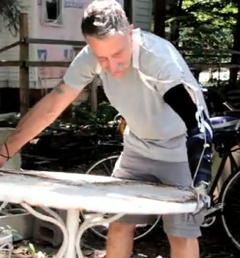Designing a cheaper, simpler prosthetic arm

Most prosthetic arms are custom-made and cost thousands of dollars. But an Illinois-based non-profit, Illini Prosthetic Technologies (IPT), has come up with a much more affordable, pre-made alternative. It's operated by simple physical actions to control mechanical hooks that mimic a human hand. The Open Socket prosthetic arm, as it's called, is designed primarily for audiences in the developing world, which accounts for 80% of the globe's 25 million amputees. It costs a mere $100 dollars, comes in various sizes, and has steadily been gathering awards in recent months.
Here’s a video detailing the concept. (It features Adam Booher, IPT's director of product development, and a member of a team of University of Illinois, Urbana-Champaign graduates who lead the company):
In August, one of IPT's founders, Jonathan Naber, won a $10,000 Simon Fellowship for Noble Purpose from the Intercollegiate Studies Institute. Also in August, the company was named "Inventor of the Month" by software maker Autodesk. And on November 8, the Open Socket design tied for second place honors in the competition for the 2011 James Dyson Award, a prestigious international design prize. The company has also received funding from the Clinton Global Initiative; Naber won a $30,000 Lemelson MIT-Illinois Student Prize for the prosthetic arm concept in 2010.

IPT says their concept is inspired by the evolution of shoe- making from bespoke design businesses to mass-market manufacturing. The goal, of course, is to drive down the cost for resource-challenged amputees. So far, IPT has conducted user testing at Northwestern University in Illinois and in Zacapa, Guatemala. The company is currently working to bring the prosthetics to market.
Although the Open Socket was intended for developing-world audiences, it's clear that its easy-to-use and inexpensive design will likely appeal to amputees around the world seeking affordable alternatives to costly devices, including in the United States. It could prove to be an intriguing example of a non-profit practicing "trickle-up" innovation, or the application of inventive, low-cost, and simple-to-use concepts originally created for emerging-market nations that can easily be adopted by "developed world" audiences as well.
Related on SmartPlanet:
A prosthetic arm with a built-in smartphone dock
With inspiration from the sea, rethinking the prosthetic arm
Dean Kamen shows of DEKA Luke prosthetic arm on Colbert Report
Biomimetic irrigation system wins James Dyson Award
Images: IPT/Flickr, Vimeo
This post was originally published on Smartplanet.com
